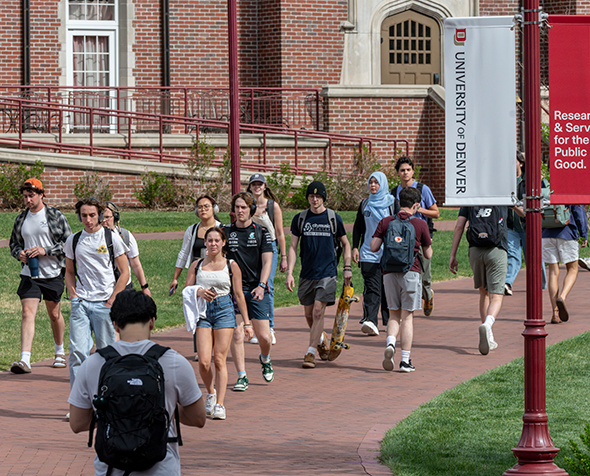Faculty and Staff Grants From August 2024
Congratulations to the University of Denver faculty and staff members who received grants and awards in August 2024 for the following projects.
Collaborative Research: Broadening Perspectives on Innate Immunity ‒ The Response of Diverse Eukaryotes to a Common Bacterial Pathogen
- Scott Nichols, College of Natural Sciences and Mathematics
- Grant from the National Science Foundation
- Abstract: This project will test the hypothesis that organisms with high levels of microbial exposure may disproportionately rely on “effector-triggered immunity” (ETI) to monitor for pathogen activity, as opposed to “pattern recognition receptors” (PRRs) that detect the presence of microbes. This strategy will enable the discovery of immune genes and mechanisms in diverse eukaryotes and provide insights into the evolutionary origins of innate immune signaling pathways.
Embodied Spiritual Pathway: Experimental, Applied and Cross-Cultural Studies of Labyrinths and Flourishing
- Daniel McIntosh, College of Arts, Humanities and Social Science
- Grant from Indiana University (subaward from the John Templeton Foundation)
- Abstract: The project seeks to understand how walking inside or finger-tracing labyrinth shapes may promote mental health and personal growth. The research will involve studies conducted in university communities, geriatric facilities and rehabilitation contexts, with practitioner-partners in multiple countries beyond the U.S., including Vietnam and Indonesia.
Building Blocks for W-algebras
- Andrew Linshaw, College of Natural Sciences and Mathematics
- Grant from the National Science Foundation
- Abstract: Vertex operator algebras (VOAs) are fundamental structures that emerged from conformal field theory in the 1980s. This project builds on recent work and will significantly advance the theory of VOAs and their applications in physics.
Virginia Consulting Services ‒ Preferred Provider Agreement
- Charmaine Brittain, Graduate School of Social Work
- Grant from the Virginia Department of Social Services
- Abstract: The Butler Institute is a preferred provider for the Virginia Department of Social Services, assisting in leadership development, coaching, team building, strategic planning, communications and branding services.
Automated Planning for Optimal Implant Selection and Alignment in Total Shoulder Arthroplasty
- Casey Myers, Ritchie School of Engineering and Computer Science
- Grant from the Colorado Office of Economic Development and International Trade
- Abstract: This project aims to develop a working prototype that will establish functional targets for successful total shoulder arthroplasty (TSA). It will develop an automated “scan-to-simulation” algorithm for creating 3D patient-specific models of shoulder anatomy and material properties, alongside developing an automated alignment tool for TSA.
Product-Oriented Development of Innovative, Compact, Multifunctional Spectrometer for Stereochemical Analysis
- Dali Sun, Ritchie School of Engineering and Computer Science
- Grant from the Colorado Office of Economic Development and International Trade
- Abstract: This project aims to further refine and miniaturize a novel elliptical dichroism (mED) spectrometer, originally developed for structural analysis. The goal is to transform this technology into a widely accessible, compact and user-friendly tool for stereochemical analysis, meeting the growing demand across industries like pharmaceuticals, environmental monitoring and food safety.
Denver Basic Income Project
- Daniel Brisson, Graduate School of Social Work
- Grant from the Denver Basic Income Project
- Abstract: This project focuses on research and evaluation related to the Denver Basic Income Project, including its impacts on housing, financial well-being, health, family and social networks, public service interactions and program processes.
Collaborative Research: Data-Driven Interviewing to Study Embodied Cognitive Shifts During Geometry Learning
- Stephen Hutt, Ritchie School of Engineering and Computer Science
- Grant from the National Science Foundation
- Abstract: The project supports the development and integration of automated detectors for embodied cognition events of interest. It will apply machine learning expertise and data analysis to aid in understanding cognitive shifts during geometry learning and disseminate the findings through scientific papers and reports.
New Dental Materials From Existing Chemical Feedstocks Via Light-Based Additive Manufacturing
- Brady Worrell, College of Natural Sciences and Mathematics
- Grant from the Colorado Office of Economic Development and International Trade
- Abstract: The project will evaluate the commercial potential of catalytic chain transfer agents (CCTAs) developed by the Worrell Lab to improve the mechanical properties of (meth)acrylate-based dental materials. These materials are produced via light-based 3D printing, and the grant aims to reduce brittleness, warpage and dimensional inaccuracy in the resulting materials.
Combinatorial and Representation-Theoretic Aspects of Vertex Operator Algebras
- Shashank Kanade, College of Natural Sciences and Mathematics
- Grant from the Simons Foundation
- Abstract: This project focuses on vertex operator algebras and their combinatorial aspects. It involves representation theory of these algebras and their relations to knot theory. The grant will provide travel support to further collaborations.
Building Blocks for W-algebras
- Andrew Linshaw, College of Natural Sciences and Mathematics
- Grant from the Simons Foundation
- Abstract: W-algebras are an important class of vertex operator algebras (VOAs). The project aims to realize non-principal W-algebras as extensions of tensor products of well-understood building blocks, clarifying their structure and representation theory.
Understanding Combinatorics Through an Interdisciplinary Lens
- Mei Yin, College of Natural Sciences and Mathematics
- Grant from the Simons Foundation
- Abstract: The research aims to develop a quantitative theory of "phase transitions" in discrete structures within the fields of statistical physics and combinatorics. The study will investigate how small local changes in structures can result in dramatic shifts in the entire system's properties.
Adolescent Brain Cognitive Development: Social Development Sub-Study (ABCD-SD)
- Henrika McCoy, Graduate School of Social Work
- Grant from the University of Pittsburgh (subaward from the National Institute of Justice/Department of Justice)
- Abstract: Dr. McCoy will participate in project meetings, supervise a local research assistant and advise on scientific and social justice topics. She will co-author scientific papers based on the study's data and present findings at conferences and meetings.











